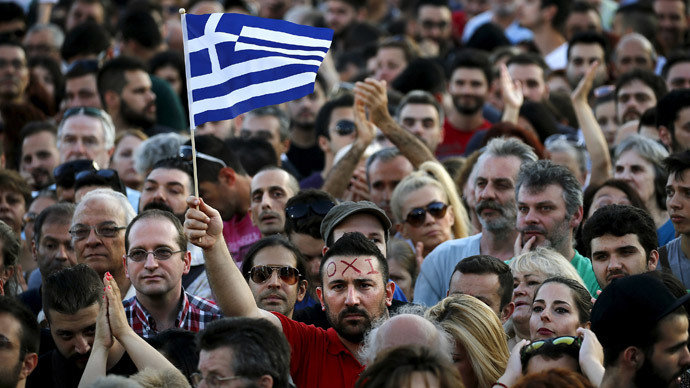‘No’ and ‘Yes’ bailout referendum rallies gather thousands in Athens

Two rival rallies took place in Athens on Friday. Police estimate that 25,000 came out to support the ‘No’ camp, which calls for the rejection of a new bailout deal with creditors in Sunday’s referendum, while 20,000 gathered to back the “Yes” vote.
Greece’s Prime Minister, Alexis Tsipras, who called the referendum last week to add more weight to his position in talks with creditors, addressed the “No” demonstration in front of the Greek parliament.
He urged the crowd to say a “proud No to ultimatums and those who terrorize you,” saying Sunday’s plebiscite is about “staying in Europe, and deciding to live in dignity in Europe.”

But no matter the outcome, the vote will be a “celebration of democracy,” he added.
The “No” rally was marred by brief clashes between police and protestors in a square next to Syntagma. Security forces had to use stun grenades and pepper spray to disperse a few dozen aggressive youths, who were throwing rocks and vandalizing property.
READ MORE: Debt crisis: Will Greece exit euro?https://www.rt.com/news/269026-greece-bank-debt-crisis/
The “Yes” gathering, which was staged less than a kilometer away from the “Oxi [No]” rally, saw thousands chanting pro-EU slogans.

Friday was the last day of campaigning before the July 5 referendum to decide if Greece should accept its creditors’ demands for more austerity in return for more loans.
A poll published by To Ethnos newspaper on July 3, just two days ahead of the referendum, showed that the “Yes” and the “No” camps were running neck and neck.
Of those surveyed, 41.5 percent said they would back the bailout terms and 40.2 percent said they would reject them, while the rest remained undecided or planned to abstain from voting altogether.
If the Greeks vote ‘Yes,’ the current government is likely to resign and the people will have to accept the harsh austerity measures imposed by its Troika of creditors.
EU officials and the Greek opposition have warned that a ‘No’ vote would likely lead to Greece’s exit from the eurozone and potentially the EU, raising questions about the viability of the euro currency.
The talks between Greece and its creditors have stalled since the end of June, after the Eurogroup declined to prolong a financial aid program for Greece or delay payments on earlier debts.
READ MORE: Greek solidarity protests across Europe ahead of referendum
Smaller demonstrations involving hundreds of people expressing solidarity with Greece’s ‘No’ camp took place in other cities across the EU, including in Rome, Brussels, Berlin, Frankfurt and Warsaw.













